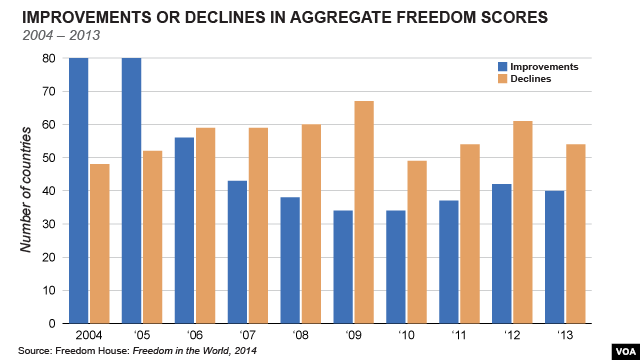The international rights group Freedom House reports that 2014 saw an overall decline in political rights and civil liberties around the world, concluding that democratic ideals are under the greatest threat in 25 years. The group ranked Syria at the bottom and cited violence in Ukraine.
2014 was marked by an explosion of terrorist violence and brutal tactics, according to the international rights group Freedom House, making it an "exceptionally grim" year.
In its annual report, released Tuesday, the group notes that the decline in democratic ideals spread across the world, with Syria receiving the lowest country score in over a decade. Syria has been caught in civil war and terrorist violence for years.
Tunisia was the one exception, becoming the first Arab country to achieve the group's status of "free" in the past four decades.
Arch Puddington, vice president for research at Freedom House, told VOA the most significant declines in freedoms were caused by terrorism.
"One of the most discouraging developments, is this upsurge in terrorism," he said. "We have never seen in the past, ever seen the impact of terrorism on democracy to be as significant as it was in 2014."
Puddington said terrorist attacks have led to thousands of people being uprooted from their homes, women kidnapped or seized as prizes of war, and the massacres of religious minorities in Africa, the Middle East and South Asia.
A lack of democratic governance, Freedom House says, created the environment for terrorism to grow.
Political repression
Political repression
Freedom House says some 2.6 billion people, or about a third of the world's population, live under "not free" conditions, suffering under political repression, indiscriminate violence, gender violence, state surveillance, and curbs on personal movement, expression and communications.
Other examples included Egypt's roll back of the democratic gains of the Arab Spring, with its suppression of the media, human rights organizations and political dissidents. Turkey, too, saw an aggressive campaign against pluralism, as did China.
Thomas Hughes, executive director of Article 19, a British human rights organization, added that changes by the United States and other Western allies also have had negative implications.
"The other really worrying trend has been that in countries in Europe and North America where we've seen the traditional strong defenders of human rights internationally, because of their encroachment around issues such as mass surveillance, encroachment around human rights related issues, this sets a very negative precedent," said Hughes.
But people at the grass roots level in Ukraine, Hong Kong and Brazil are pushing back, according to both Freedom House and Hughes.
Hughes said recent U.N. work toward sustainable development goals will help countries on issues such as human rights and freedom of expression.
"Without those standards and without support to grass roots civil society you cannot hold governments, lawmakers, and other power brokers to account," he said.
The biggest mistake democracies can make, says Freedom House, is to accept the proposition that they are impotent in the face of strongmen for whom bullying forms the basis of political exchange. Ordinary citizens, the organization says, have shown their willingness to challenge such rulers.
Rejections of democratic standards
More troubling, Freedom House said, are more explicit rejections of democratic standards, such as Russia's invasion of Ukraine, "including the outright seizure and formal annexation of Crimea," which it noted as a "prime example."
Freedom House also said Chinese President Xi Jinping has grown more aggressive about defending disputed maritime territory, and as his anti-corruption sweep has reached deeply into the Communist party, the report said the probe has ignored the principles of due process.
Freedom House named one other possible culprit for the decline in democratic freedoms: the fight against terrorism. It said governments such as Venezuela, Kenya and China have invoked terrorism laws to silence dissent.









